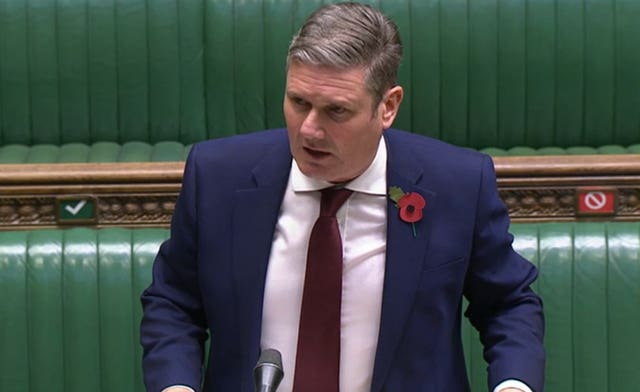PM says nation will ‘defeat this virus by the spring’ in address to anxious MPs
Boris Johnson’s comments come amid opposition to new measures from some MPs.

Boris Johnson has said technological advances will “defeat this virus by the spring” as he tries to ward off a growing Tory rebellion over the second national lockdown for England.
The Prime Minister promised MPs a fresh vote on the next stage of measures to combat coronavirus when “we intend to return” to a regional tiered system on December 2.
And he announced greater support for the self-employed after extending the furlough scheme for employees as pubs, restaurants and non-essential shops are ordered to close.
But a growing number of senior MPs on the Conservative backbenches have said they will oppose the new lockdown during a vote on Wednesday, a day before it is set to come into force.
Mr Johnson hailed advances in medicine including “virtually instant” Covid-19 tests and said there is a “real prospect” of a vaccine in the first quarter of next year.
“I believe that these technical developments, taken together, will enable us to defeat this virus by the spring as humanity has defeated every other infectious disease,” he said.
He insisted that the national lockdown, if approved by MPs, will automatically expire next month and said that the Commons “will have a vote to agree the way forward”.
And the Prime Minister warned that “without action” there could be twice as many deaths over the winter as in the first wave, meaning there is “no alternative” but another national lockdown.
He said Covid-19 presents an “existential threat” to the NHS with doctors being forced to choose which patients to treat and “who would live and who would die”.
With Chancellor Rishi Sunak beside him, Mr Johnson announced that the Government will double support for the self-employed for November from 40% to 80% of trading profits.
Sir Keir Starmer accused the Prime Minister of a “catastrophic failure of leadership” for having rejected a recommendation from scientists advising the Government to impose a shorter “circuit-breaker” lockdown in September.
The Labour leader warned that the “human cost” of a growing daily death rate was a result of Mr Johnson being “behind the curve” at every stage.
And Mr Johnson also faced growing unrest from his own MPs, who are angry over the impact to the economy of a new shutdown and on personal freedom.
Sir Charles Walker, the vice-chairman of the 1922 Committee of Tory backbenchers, said he would vote against the legislation, arguing that the UK is drifting “further into an authoritarian, coercive state”.
Another reason for their anger is that several newspapers learned on Friday that a new lockdown would be imposed, before Mr Johnson updated the public or Parliament.
Commons Speaker Sir Lindsay Hoyle has said any MP found to have leaked details over the second lockdown should apologise for displaying “discourteous and unacceptable” behaviour.
Earlier in the day, a scientist advising the Government said “thousands of lives” would have been saved if a two-week “circuit-breaker” was imposed when it was recommended by the Scientific Advisory Group for Emergencies (Sage) on September 21.
Professor Andrew Hayward, who sits on the New and Emerging Respiratory Virus Threats Advisory Group, told BBC Radio 4’s Today programme that the move would also have “inflicted substantially less damage” to the economy than the new national lockdown.
Instead, the Prime Minister continued to pursue his regional approach until Thursday when severe restrictions on social contact will again be imposed across the nation.
People will be allowed to exercise and socialise in outdoor public spaces with their household or one other person, while schools, colleges and nurseries will stay open.

The Prime Minister pulled out of a speech to business leaders at the CBI conference ahead of addressing MPs over the lockdown.
Sir Keir attempted to apportion some of the blame for dismissing earlier calls for a short, sharp lockdown onto Mr Sunak, telling the CBI that “the Chancellor’s name is all over this”.
“His decision to block a circuit-breaker, to dismiss it as a ‘blunt instrument’ and to pretend that you can protect the economy without controlling the virus will now mean that businesses have to close for longer, more people will lose their jobs, and the public finances will be worse than they needed to be,” the Labour leader added.
Any Tory rebellion on Wednesday is likely to be only symbolic, with Labour poised to back the Government on the measures.
Conservative former Cabinet minister Esther McVey said she would vote against the four-week lockdown because the “‘lockdown cure’ is causing more harm than Covid”.
And Sir Graham Brady, the influential chair of the Tories’ 1922 Committee, said: “If these kinds of measures were being taken in any totalitarian country around the world, we would be denouncing it as a form of evil.”
In other developments:
– Mr Johnson said the Government had hit its target of increasing Covid-19 testing capacity to 500,000 per day.
– A further 23,254 people tested positive for coronavirus as of Sunday, while another 162 deaths were reported in the UK.
– Wales will introduce new national measures when its 17-day firebreak lockdown ends but will permit two households to meet at home if they form a “bubble”.
– Scotland moved to a new five-tier level of restrictions on Monday, as First Minister Nicola Sturgeon warned she would not hesitate to increase the level of protection either locally or nationally if required.
– Schools in Northern Ireland reopened on Monday after an extended half-term holiday, though other lockdown restrictions will remain in place until November 13.





